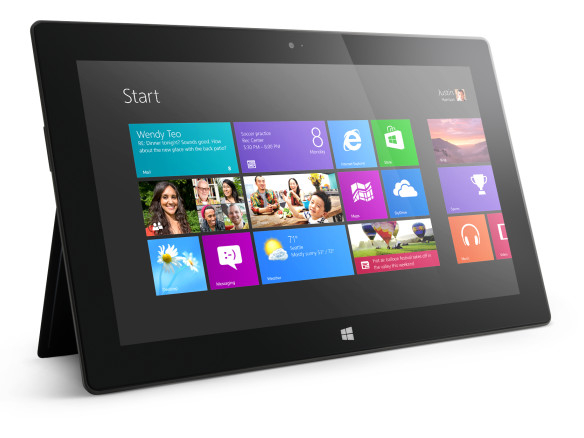Nvidia Sees Great Future with Windows RT
Nvidia fully supports Windows RT.
Rene Haas, vice president of computing products at Nvidia, told Computerworld in an interview that the company is committed to Windows RT for the long term. That's good news given that supporters for the ARM-based version of Windows 8 seem to be dwindling by the week. Most device makers have either completely ignored Windows RT and focused all of their attention to the x86-based Windows 8, or placed their Windows RT plans on hold. Nvidia, it seems, has Microsoft's back.
"Surface RT is the very beginning of a long process and it's the first shot in a changing landscape," Haas said. "Microsoft is moving the entire Windows platform to something really mobile."
And Haas has a point. Windows RT is a new breed of Windows, living outside the x86 realm. It hasn't even been an entire year since the platform was launched, meaning there's lots of room for improvement, and to grow its own ecosystem. Unfortunately, its plagued with the inability to run x86-based software that consumers are accustomed to using on their desktop, thus likely leading to poor sales of Surface RT and Windows RT-based tablets.
To get around this roadblock, Microsoft will need to accelerate its goal in creating a unified platform on Windows Store. Reducing the price of Surface RT will also help, and recently Microsoft and a number of retailers began doing just that: selling Surface RT at a discounted price. This was seen as a move to clear inventory for the next-generation Surface RT sporting Windows RT 8.1 later this fall. Whether this new price point will inspire new sales remains to be seen, but Haas remains hopeful that it will. Nvidia's own Tegra 3 quad-core SoC resides in Surface RT, and now it's selling for $349 (32 GB) and $449 (64 GB).
Haas said in the interview that Nvidia employees are already using Surface RT tablets sporting the 8.1 update which sports Microsoft Outlook and VPN improvements. "Outlook in 8.1 is a big, big deal for us, and it's not a baby version of Outlook or somehow stripped down. We can use it to book meetings and other ways and it's completely productive and a big item for us," he said, adding that other organizations will find Windows RT 8.1 valuable.
He also briefly touched the subject of Microsoft's reorganization, calling it encouraging, as Surface development is now under the helm of long-time Microsoft exec Julie Larson-Green. "Think about Microsoft essentially owning hardware as well as Amazon and Google," he said. "Over time, that's exciting."
Nvidia previously stated that its new Tegra 4 SoC will be used in multiple Windows RT tablets. Haas wouldn't elaborate on when, or what types of future RT products will appear. However Jack Gold, an analyst at J. Gold Associates, said he doesn't believe any tablet maker will produce a Windows RT tablet in the future. Even more, Nvidia is reportedly "blowing smoke" about the future of Windows RT and Surface RT because marketing people don't want to spook the market with negativity.
Get Tom's Hardware's best news and in-depth reviews, straight to your inbox.
"RT is dying overnight. RT is going to die a slow death," he told Computerworld.

Kevin Parrish has over a decade of experience as a writer, editor, and product tester. His work focused on computer hardware, networking equipment, smartphones, tablets, gaming consoles, and other internet-connected devices. His work has appeared in Tom's Hardware, Tom's Guide, Maximum PC, Digital Trends, Android Authority, How-To Geek, Lifewire, and others.
-
delaro Maybe when all Tablets come with 64gb+ of ram, at the moment it takes up to much space and uses to much power. I can do everything in Android and it's far less ugly to look at.Reply -
captaincharisma the only way RT will survive will be if MS comes up with a way for it to run any program the x86 version can. if not then it will end up having a shorter life than the arm version of windows NTReply -
DRosencraft After losing nearly $1 Billion on RT, I guess it's time to try about anything. Nvidia isn't completely wrong, but I don't know RT ever had a strong path forward.Having RT and Pro, it's like trying to split your own user base.Reply
Anyone see the numbers on the Surface Pro? I know it supposedly has done better than the RT, but I don't really see much mention of it. -
anononon Well if this is the case, Nvidia is seeing something that most do not...Reply
I cant see this going well, the RT windows was a flop from the start. -
halcyon ReplyJack Gold, an analyst at J. Gold Associates, said he doesn't believe any tablet maker will produce a Windows RT tablet in the future. Even more, Nvidia is reportedly "blowing smoke" about the future of Windows RT and Surface RT because marketing people don't want to spook the market with negativity.
"RT is dying overnight. RT is going to die a slow death," he told Computerworld.
This, to me, is the best part of the article as it seems to be the obvious truth. -
darkavenger123 Wow. Nvidia is excited about a DOA platform. Must be desperate for Tegra sales.Reply
